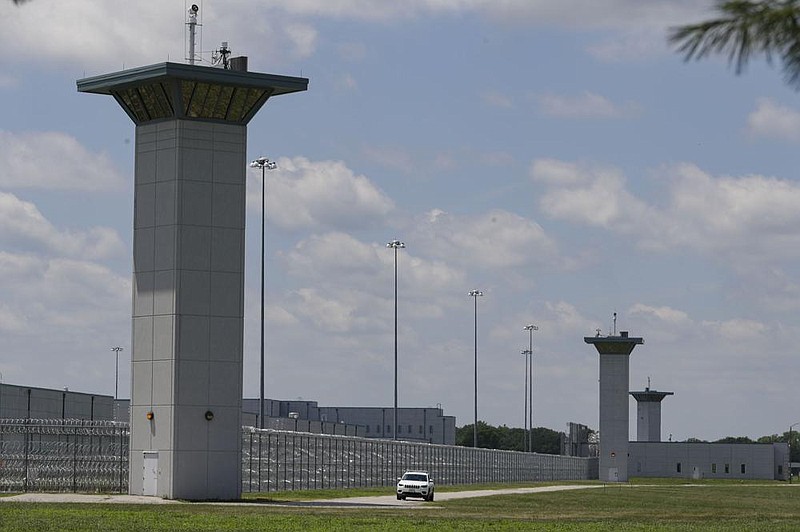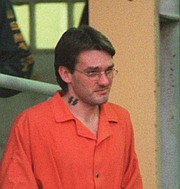Monica Veillette and her family didn't want Danny Lee to die for killing her aunt and cousin, but they still felt a moral obligation to witness the execution.
The coronavirus pandemic prevented them from traveling to do that -- the final emotional blow in a 24-year saga of grief that began when they got the call that the bodies of three of their family members had been pulled from an Arkansas bayou.
The insult to the injury was no phone call, warning or explanation from the U.S. Department of Justice about the decision to move forward with Lee's execution last week. The last-minute stays and legal filings left the killer waiting, strapped to a gurney, for four hours in the early hours of the morning.
Veillette, who lives in Spokane, Wash., said she won't forgive Attorney General William Barr for exploiting her pain and that of her family for his desired ends.
"William Barr stole that piece of our healing from us by pushing this [execution] forward during a pandemic when we couldn't safely attend," she said.
Lee, 47, was declared dead at 8:07 a.m. Tuesday. He and his accomplice, Chevie Kehoe, killed William Mueller, 52; Mueller's wife Nancy, 28; and her 8-year-old daughter, Sarah Powell, inside their Tilly-area home on Jan. 11, 1996, and dumped their bodies into the Illinois Bayou outside Russellville.
The victims were asphyxiated with plastic bags and duct tape, then taken to a bridge and dropped into the water.
Lee and Kehoe were convicted in 1999 in U.S. District Court in Little Rock. Kehoe -- who, according to court testimony, was the leader and the one who killed Sarah -- received a life sentence. Lee, who prosecutors said posed a clear violent threat, was sentenced to death.
Lee was executed by lethal injection Tuesday at the U.S. penitentiary in Terre Haute, Ind. He was the first federal inmate to be executed in more than 17 years.
The only witness to Lee's execution, other than prison officials and members of the media, was Lee's spiritual adviser, an Appalachian pagan minister, according to the federal Bureau of Prisons.
Veillette, 43, is the niece of Nancy Mueller and cousin of Sarah Powell. She, along with her mother, Kimma Gurel, 61, and grandmother, Earlene Branch Peterson, 81, filed a motion in federal court days before Lee's scheduled execution requesting that it be delayed until after the public-health emergency. A U.S. district judge in Indiana agreed with the plaintiffs and ordered the execution halted.
The Justice Department appealed the ruling, and an appellate court lifted the injunction. The execution was back on for 4 p.m. Monday, until a federal judge in Washington, D.C., ordered an injunction for a different reason. Federal inmates had filed a motion alleging that the lethal-injection protocol was cruel and unusual punishment.
An appeals court late Monday refused to stay the injunction, so the Trump administration appealed it to the U.S. Supreme Court. Around 2 a.m. Tuesday, the high court voted 5-4 to lift the injunction. As a result, Lee's execution was rescheduled for 4 a.m. that day.
Another late filing meant that Lee waited another four hours before being executed.
Veillette said no one in her family was apprised of the situation.
"Who does something like this in the middle of the night [and] feel good about it?" she wrote in an email to the Arkansas Democrat-Gazette several hours after Lee was executed.
"What does it say about them that they disregard our rights and voices and valid health and safety concerns while calling them 'frivolous'?" she said, referring to the language the Justice Department used in its court filings to lift the first injunction.
"My 81-year-old gramma had her daughter and granddaughter murdered, but even in her never-ending sorrow, made the choice to fight for justice because it's the right thing to do according to her own morals and faith," Veillette wrote. "[That] says something about her immense courage and sense of belief that our justice system should serve and protect all people fairly and equally, including Daniel Lee and including her."
A FOUR-HOUR WAIT
The Justice Department confirmed Friday to the Arkansas Democrat-Gazette that Lee was strapped to the gurney Tuesday for about four hours, from 4 a.m. until just before 8 a.m., when the lethal injection was administered.
The agency said Lee, while lying on his back for those four hours, "had access to his spiritual advisor and was able to have moments of prayer" while he waited for a Washington appellate court to issue a ruling to proceed with the execution.
Bureau of Prison officials refused to provide details that media members normally receive on execution days, including the condemned inmate's last meal and a list of final visitors. A spokeswoman at the prison said the government would not "sensationalize" the execution.
Ruth Friedman, director of the Federal Capital Habeas Project in Washington, the legal agency that represented Lee during the appeals process, said she and her two attorneys who worked the most on the case did not attend the execution because of their concerns over the coronavirus outbreak.
"Danny's lawyers each have health conditions, including me, or have vulnerable people in our care," Friedman said. "Having social-distanced and isolated for four months ... we did not want to hazard planes or the prison. It was not a choice made easily by any of us."
Friedman said she had no explanation for the federal government's choice to pursue Lee's execution in the manner that it did.
"I don't know why they rushed this execution," she said. "I just know that they did."
After Lee's death, the Department of Justice moved forward with two more executions last week. Wesley Ira Purkey, convicted of killing a 16-year-old girl in Missouri, was executed Thursday. Dustin Lee Honken, who killed five people in Iowa, including two young girls, was executed Friday.
"I think they wanted to get some executions out there, so that they could succeed and say they did it," Friedman said. "As to the why, I think that question is for them ... They can say they did it for the victims' families, but we know that's not true.
"I didn't see any clamoring for it [from the public] and I didn't see any clamoring for it to happen in the middle of the night."
EXECUTION QUESTIONS
Robert Dunham, director of the Death Penalty Information Center in Washington, said the government pushed for the executions to happen in spite of the legal challenges to the lethal-injection protocol.
Lee was the first federal inmate to be executed using pentobarbital. Previously, the condemned were executed with a three-drug method.
Some states use pentobarbital and studies have shown that it is a "demonstrably inappropriate drug," Dunham said.
The Death Penalty Information Center does not take a position for or against capital punishment, but is critical of the way it is administered.
In 2019, prisoners filed a challenge to the pentobarbital protocol arguing that it was cruel and inhumane. One alternative method they suggested was death by firing squad, which according to the center, has historically been the only method that has never been botched. Lethal injections, by comparison, have the highest percentage of botched attempts at more than 7%, according to the center.
Pentobarbital, Dunham said, can be akin to waterboarding and drowning.
"Most Americans think of, or have thought of in the past, lethal injections being a peaceful way to put someone to sleep, but autopsy results show that's not true," Dunham said.
Lee was injected shortly after 7:45 a.m. There was no clock in the viewing room and reporters were not permitted to wear watches, so a precise timeline is not known.
Based on the 8:07 a.m. death declaration, it took more than 20 minutes before Lee was officially pronounced deceased. His chest heaved for several minutes before his fingertips turned blue. More minutes went by before a doctor behind a viewing glass made the announcement.
Dunham also was critical of the speed of Lee's execution. He called the federal government's conduct "highly questionable" because the prisoner was not give valid legal notice or warning about his pending execution.
The Supreme Court ruled after 2 a.m. to proceed with the execution. It isn't known whether Lee was asleep and had to be awakened to the news that he was hours away from death.
There was also the additional four hours of wait time while he was on the gurney.
Lee was scheduled to die on Monday, prompting some legal observers to question whether the Bureau of Prisons followed regulations by executing him early Tuesday. Typically, state governments will not pursue executions after 11:59 p.m. of the day of the death warrant because the warrant expires.
"In my view, standing over somebody who is strapped to a gurney and telling him, 'We're going to execute you now' is not valid legal notice," Dunham said.
The Justice Department didn't directly respond to a question about when Lee was notified that he would be executed early Tuesday.
He also accused the government of ignoring the inmates' filing in federal court arguing against the lethal-injection protocol. The final motion made by defense attorneys was an urging of the courts to take more time to review that filing.
The Justice Department, in turn, accused Lee's attorneys of waiting until "the eleventh hour" to raise the issue. Dunham, like Friedman, rejected that accusation.
"Conduct of that nature is unlike anything we've seen in modern death-penalty history," Dunham said.
"With any other legal issue, such a [question] would have been respected more," he continued. "Basically, an issue over a repossessed car was given greater respect over whether a human being should die. That's a disgrace."
CULPABILITY QUESTIONS
Based on court documents and testimony, Kehoe planned to steal cash, weapons and other property from the Muellers to help finance a whites-only nation in the Pacific Northwest. Lee was going to be his second-in-command.
Lee and Kehoe were tried together, but were sentenced separately. Kehoe was sentenced first and jurors, after hearing testimony from witnesses, recommended a life sentence for Kehoe. Days later, they recommended the death penalty for Lee, a decision that was questioned by both the lead federal prosecutor and the trial judge. The judge officially sentenced Lee to death years later only after an appellate court ordered him to do so.
In a statement Tuesday, Barr said Lee "finally faced the justice he deserved" for the "most egregious federal crimes" he committed.
Kerri Kupec, a Justice Department spokeswoman, said Barr appreciated the "hard work, dedication and professionalism demonstrated by the Federal Bureau of Prisons, the United States Marshals Service, and the law enforcement and legal teams that investigated and prosecuted Lee, and that for many years defended the government's duty to carry out this lawful sentence."
In a written statement after Tuesday's execution, Bureau of Prisons spokeswoman Jenna Epplin stated that Lee "murdered an eight-year-old girl, Sarah Elizabeth Powell, and her parents ... as part of an effort to obtain funds for a white supremacist organization."
The understanding of everyone directly involved in the case, including local and federal investigators and prosecutors, was that Kehoe was the killer of the child. He did so after Lee refused, they said.
Before he was executed, Lee said he was not responsible for any of the killings. He said he and his accomplice weren't even in Arkansas when the killings took place.
"I didn't do it," he said. "They're killing an innocent man."
Aaron Duvall, who at the time of the crime was one of the detectives who worked on the case for the Pope County sheriff's office, said the investigation was a "complicated" one that "dragged on for three years."
The jury's decision to sentence Kehoe to life and Lee to death also wasn't the result he expected.
"I was surprised that Chevie did not get the death penalty, but that was the finding of the jury," he wrote in an email last week to the Arkansas Democrat-Gazette.
Duvall had no comment on Lee's proclamation of innocence and said he had no desire to witness the execution.
Veillette said she and her family wanted Lee to get the same sentence as Kehoe. Her grandmother, a supporter of President Donald Trump, made a public plea last year to Trump to grant Lee clemency.
Veillette took aim again at Barr for how he pursued Lee's death.
"He paraded our pain and tragedy around by saying he was doing this for the 'families of the victims,'" she said.
Veillette added that her grandmother was "hurt and angry" about the tactics used by the Justice Department, something she described as "pure evil." No one from the Justice Department called her, Peterson or any other family member to give an update or explanation, she said.
"Once again, we are left with injustice and sadness," Veillette said. "I can't imagine this is the best we can offer to families of victims in this country because no one should have to go through what we have since losing our family members."



